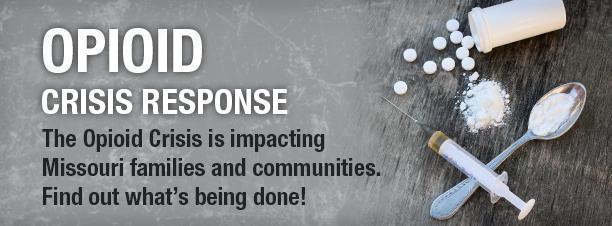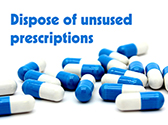The Missouri Department of Corrections is working with several partners across Missouri in order to address the growing problem of opioid and heroin overdoses. Missouri Governor Eric R. Greitens has called the opioid crisis in Missouri a public health crisis that is overwhelming law enforcement, health care and social service providers. Here is what the Missouri Department of Corrections is doing to help combat this epidemic:
Medication-Assisted Treatment (MAT)
Medication-Assisted Treatment (MAT) is an evidence-based practice that combines pharmacological interventions with psycho-social treatment programs and recovery supports. For individuals with substance use disorders, MAT has become an essential part of a comprehensive array of services available to people struggling with addiction to alcohol and other drugs. In collaboration with the Missouri Department of Mental Health, Gateway Foundation and Corizon Health, the Division of Offender Rehabilitative Services facilitates the provision of one type of medication intervention (MAT) to offenders in treatment for alcohol and opioid use disorders in order to help the prevention of relapse prior to release. After release from incarceration, offenders receive MAT in the community for a duration to be determined by medical professionals in consultation with counseling professionals.
Vivitrol is an injectable form of naltrexone that, when used to assist in the treatment of opioid or alcohol use disorders, can reduce the cravings associated with withdrawal and relapse. After substance use disorders screening, education and medical testing in the treatment centers, eligible offenders who volunteer to participate receive their first injection of Vivitrol several days prior to their release. After release on probation, parole, and in 3-4 weeks after their first injection, the offenders continuing in outpatient substance use disorders treatment will receive a second injection of Vivitrol. Offenders in treatment who are receiving medication may, with a doctor’s order, switch to one of several other medications (such as buprenorphine or methadone) that are also effective in the treatment of opioid use disorders.
At this time, eligible offenders returning to St. Louis and St. Louis after completing institutional substance use disorders treatment may volunteer to receive both case management services and a pre-release injection before commencing outpatient services in the community. The services, both in the institutional treatment centers and the community are provided by Gateway Foundation through a contract with the Missouri Department of Mental Health. Gateway works in partnership with New Beginnings Alt-Care in St. Louis and Rediscover and Heartland Behavioral Health in Kansas City to foster effective continuity of care.
The department is currently working with Gateway Foundation to increase the use of MAT with offenders with alcohol and opioid use disorders prior to release. This fall MAT will be available for eligible offenders completing treatment centers at correctional facilities in Boonville, Chillicothe, Cremer, Farmington, Fordland, Fulton, Maryville, St. Joseph and Vandalia. In FY18 approximately 100 to 150 offenders returning to a variety of locations in the state will also have the opportunity to receive the services as well.
The department will continue to find opportunities to implement MAT pilot programs with treatment courts in multiple locations throughout Missouri. At this time, the department collaborates with the Office of State Courts Administrators and treatment courts in Franklin and Gasconade counties to foster the continuity care for MAT for offenders referred by those courts to institutional treatment who will be returning to treatment courts after release.
High-risk communities
The Division of Probation and Parole are working with community substance use disorder treatment providers to establish strategies in order to enhance the treatment process, especially for those who are under probation, parole and conditional release supervision and have a history of opioid use. The division will identify the best evidence-based treatment available within in the community for these high-risk individuals and develop a process of referral for those to enter community treatment when available.
For several years, staff members from the Division of Probation and Parole and the Division of Offender Rehabilitative Services have met monthly with members from the Missouri Department of Mental Health to discuss the quality of treatment that is provided within communities. The group works to identify the most effective treatment strategies and use of state money to give those on supervision the tools they need to recover from their substance use disorder. This group will continue its efforts with a more intense focus of combating the opioid crisis in Missouri and developing an effective treatment plan for individuals under supervision.
Narcan at probation and parole offices
The department provides naloxone, commonly known as Narcan, at probation and parole offices throughout Missouri. Narcan is a medicine that blocks the effects of opioids and reverses an overdose.
Educational materials for substance use disorder
The department is putting together educational materials on the substance use disorder and recovery resources for distribution to department facilities. These materials will be placed in probation and parole offices throughout Missouri and in areas of correctional centers that are accessed by inmates, such as recreation areas, libraries, housing units and visiting rooms.
Fetal Alcohol Education Program
The department is currently expanding the fetal alcohol educational program for female offenders to include education on opioids and other substances. The department partners with the National Organization of Fetal Alcohol Syndrome (NOFAS) to provide seminars to groups of female offenders at the Women’s Eastern Reception, Diagnostic and Correctional Center. NOFAS provides educational materials to all female offenders and handbooks to pregnant offenders.
Drug Take-Back Day
The Division of Probation and Parole is establishing partnerships with local law enforcement for medication take-back events. The goal will be to have a medication take-back event at each Probation and Parole office across the state. Probation and Parole administration will work with local law enforcement to establish a collaborative effort for these drug take-back programs.




